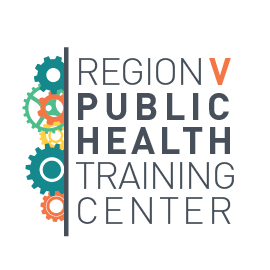By Harshada Karnik, Ph.D., M.S., M.P.P. and JP Leider, Ph.D.
Originally founded and funded by the Health Resources and Services Administration in 1999, state-based Public Health Training Centers were created with the idea of educating public health practitioners on the job. Schools and programs of public health were handling the needs of the future workforce, but what about the current practitioners? Only a small percentage of the workforce had a public health degree and the training needs were evolving. In 2014, the Public Health Training Centers changed into their current form: one training center for each of the ten U.S. Department of Health and Human Services (HHS) regions. The training centers have played critical roles in public health workforce development, including during the COVID-19 response, details of which were featured in a recent special supplement of the Journal of Public Health Management & Practice (JPHMP).
The University of Michigan School of Public Health (UMSPH) has housed the Region V Public Health Training Center (RVPHTC) since 2018, having previously served as a state-based center since 2000. The RVPHTC serves the states of Illinois, Indiana, Michigan, Minnesota, Ohio, and Wisconsin by conducting training needs assessments (TNAs), developing online trainings, and supporting student field placement and collaborative project opportunities in practice settings. The UMSPH recently concluded its first four-year grant cycle as the RVPHTC and its second cycle is underway. During the first go-round, the team and its partners experienced a variety of changes, including the COVID-19 pandemic.
We (University of Minnesota team) recently concluded an evaluation as part of our role in the RVPHTC. The evaluation looked at the impact the RVPHTC has had on its stakeholders through a review of internal systems and documents and a qualitative study that used focus groups and a ripple effect mapping exercise that internal staff and members of the advisory council participated in. We found that well-established and replicable internal project management systems that the RVPHTC developed to track projects and processes such as procedural manuals, protocols, and tracking sheets helped keep projects on task and during staff changes.
The evaluation also established that the RVPHTC contributed to the recognition of public health practice as a discipline. Funding for student placements created meaningful experiences and an increased interest in the governmental public health sector. Awareness of this sector was also increased by:
- An improved social media and internet presence
- Online campaigns, such as Public Health Thank You Day
- TNAs and the scholarship generated through them
Another noticeable impact of the RVPHTC is the growing network of collaborators it has nurtured both internally and among its partner network. Internally for staff at the central office, collaborative work has built relationships that make it much easier to find subject matter experts on a wide range of topic areas. Staff, partners, and affiliates also reported an increase in collaborative work and ease in finding ‘the perfect collaborators’ due to a bigger network of partners.
Envisioning the next few years
The COVID-19 pandemic has led to some fundamental changes in the public health enterprise nationally. While Public Health Training Centers will continue to play a critical role in training the public health workforce, they can also provide crucial pathways for students into practice. The field is seeing an exodus of young people from practice – we must find ways to engage, recruit, and retain this workforce, as well as train them. Focus group participants spoke about a vision for the next four years. In the next few years, there is an opportunity to:
- Increase awareness of resources provided to local public health departments through the RVPHTC
- Evaluate the representation of trainees, members, and affiliates from the governmental public health sector
- Further increasing trainee reach with better distribution across Region V states
- Explore new programming areas
- to help public health leaders capitalize on investments in the public health sector
- to enable public health workers to take care of themselves and their communities (eg; using trauma-informed programming)
- to develop workforce strategies to mitigate turnover
- to develop a new generation of leaders who are prepared to step into the new roles and responsibilities facing the public health enterprise (eg. leadership and change management trainings and succession planning)
There are a lot of exciting directions the RVPHTC can grow in and we are looking forward to seeing this new work in the next four years.
To learn more, check out these resources:
- RVPHTC Training Catalog
- RVPHTC Training Resources by Public Health Workforce Interest and Needs Survey (PH WINS) Domains
- Region V Public Health Leadership Institute
- Management and Mentorship Strategies for Supervisors Program
- Change Management & Adaptive Leadership On-Demand

